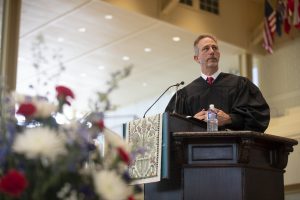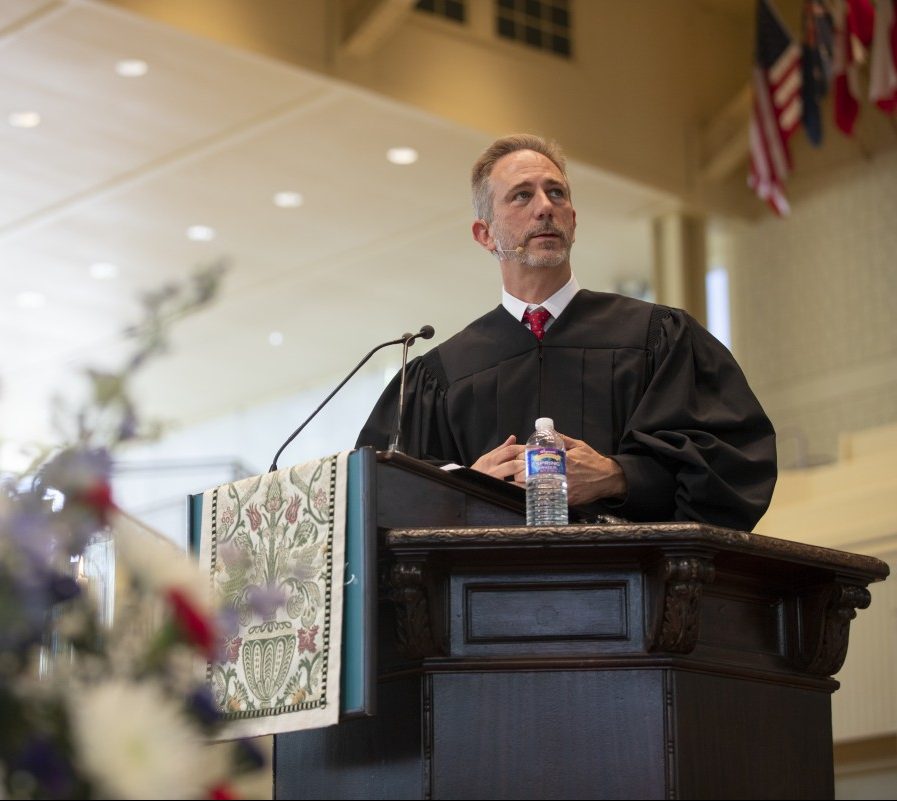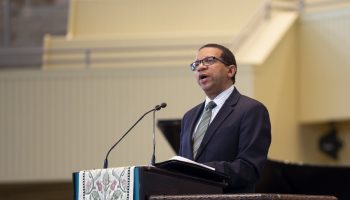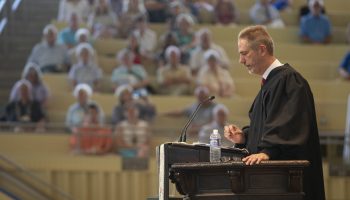“Who is my neighbor? That question should echo in our ears this morning. Who are the people to whom we owe something, to whom we need to offer care?” said the Rev. David Gushee at the 9:15 a.m. Thursday morning worship service on July 5 in the Amphitheater.
 His sermon title was “On Love,” and his sermon text was the Gospel of Luke 10: 25-37, the story of the Good Samaritan.
His sermon title was “On Love,” and his sermon text was the Gospel of Luke 10: 25-37, the story of the Good Samaritan.
Matthew and Mark’s gospels have a story similar to the one in Luke. In each, Jesus responds to a question from a lawyer, who asks what the greatest commandment is and what he must do to inherit eternal life.
The answer, Gushee said, is an amalgam of Deuteronomy 6:5: “You shall love the Lord your God with all your heart, and with all your soul and with all your might,” and Leviticus 19:18: “You shall not take vengeance or bear a grudge against any of your people, but you shall love your neighbor as yourself.”
“We need to live a life pleasing to God to live forever,” Gushee said. “Have you ever asked yourself, ‘What must I do to have eternal life?’ ”
Jesus gives the answer in Matthew and Mark, to love God and to love your neighbor — the two greatest commandments paired — to show what you need to do to have eternal life.
In Luke’s gospel, the lawyer gets the answer, and only in Luke does the lawyer get to ask another question: “Who is my neighbor?”
Gushee read the entire text of Leviticus 19:18 to set the context for how the law said Israelites should treat one another.
“They had limited obligations to resident aliens, and even fewer to their enemies,” he said. “Isn’t this how religion tied with nationalism works? We love God and we are bound in love to ‘our’ nation, ‘our’ people. There is an equally powerful call for us to hate ‘those’ people.”
In Israel under Roman rule, the question, “Who is my neighbor?” was not theoretical. For people under threat, the circle keeps getting smaller and smaller.
“When we are threatened, our circle of love shrinks,” Gushee said. “That is a debate we are having today.”
In Luke’s story, Jesus said that a man was traveling down from Jerusalem to Jericho. He went from 2,500 feet above sea level, the highest point in Israel, to 820 feet below sea level. In ancient times, this road was narrow, dangerous and filled with bandits. The traveler was overtaken by bandits, beaten, robbed and left naked by the side of the the road. Two rhetorical “bad guys,” a priest and a Levite, walked past.
“Many people have tried to figure out why they did not stop,” Gushee said. “Some say they were going up to Jerusalem to work, but I think they were going down to go home.”
Others have suggested that the men thought it was a trap or the traveler was “ritually unclean.”
“It does not matter why,” Gushee said. “What matters is they passed by without helping.”
Gushee said that Jesus may have used temple officials in this story to sharpen the edge. The temple was the seat of the official Jewish state religion set up by Herod — for Jesus, it was the “faux religious national headquarters.” The priest and the Levite could be any of us, Gushee told the congregation.
The next man to pass the wounded traveler was a Samaritan, who was moved with pity. He stopped, bandaged the man, carried him to an inn and gave money to the innkeeper to care for the man — “a blank check for his care.”
Samaria had been the capital of the Northern Kingdom of Israel, and from a Jewish perspective, the Samaritans were half-breeds who married Assyrians and Babylonians. Jews and Samaritans were neighbors but were alienated by religion and nationality.
But the Samaritan saw the man, and the sight moved his heart. He dropped everything to help.
“This is extravagant, practical, generous love in action,” Gushee said.
Love is not a sentimental feeling, according to Gushee.
“Love is seeing with compassion, entering into the situation, doing what is practically required, inviting those who are hurting into community and confronting those who did the harm,” he said. “Is this relevant? This is unsentimental, practical love.”
When Jesus finished his story, he asked the lawyer,
“Who was the neighbor?” The lawyer could not say, “It was the Samaritan.”
“The one who showed compassion,” he answered.
“Jesus told him, ‘Go and do likewise,’ dropped the mic and walked away,” Gushee said.
He invited the congregation to enter into the story as one of the characters.
“When you think of yourself as the Samaritan, you feel good about yourself and the compassionate, practical care you offered,” he said.
Seeing the story as the priest and Levite is a reminder of times of indifference, self-absorption and distraction.
“Ask God for forgiveness for those times,” Gushee said.
To see the story as the man who was robbed is to remember times when you were totally helpless and in need of rescue.
“Who came by when you were bleeding?” Gushee said. “Thank God for that person.”
What do you see in the lawyer’s questions, he asked the congregation. Is he “an honest, seeking person, or one trying to set legalistic boundaries to learn how to narrow his obligations?”
“What love requires is insightful vision, heartfelt compassion and effective action,” Gushee said. “Our neighbor is any human, especially those waiting by the side of the road.”
Jesus turned the lawyer’s question around from “Who is my neighbor?” to “Who will prove to be a neighbor to others?”
“Ask yourself, ‘In my life, will I prove to be a neighbor to people who hurt?’ ” Gushee said.
The “Jesus thing to do” does not allow for narrow obligations.
“We have a responsibility for others, especially those in need, and not just to love people, but to also love God,” Gushee said. “That is our greatest obligation on this planet and on the path to eternal life.”
Allison LoPrete presided. Carroll Stribling of St. Louis, Missouri, a part of the International Order of King’s Daughters and Sons, read the Scripture. Willie La Favor, piano, Debbie Grohman, clarinet, and Rebecca Scarnati, oboe, played Concert Piece No.1, op.113 by Felix Mendelssohn for the prelude. The Motet Choir, under the direction of Jared Jacobsen, organist and coordinator of worship and sacred song, sang “Let This Mind Be In You” by Craig Courtney. The Edmond E. Robb-Walter C. Shaw Fund and the J. Everett Hall Memorial Chaplaincy provide support for this week’s services.





